VIPsight - February 2011
COMPANIES
E.ON buys back bonds
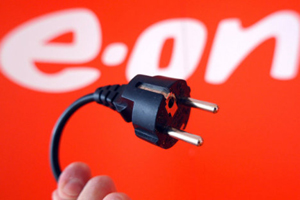 Other companies use their cash reserves to buy back shares or give special bonuses to their shareholders. Germany’s biggest energy group E.ON, on the other hand, buys back loans from its investors on a large scale. The focus is on six securities with interest rates between 4.125 and 5.25 percent and a maturity of one to three years. Financial Times Deutschland calculates the total amount at up to 7.1 billion euros. The goal is to reduce group liabilities and thus interest payments. In the wake of the expansionary acquisition policies of former E.ON CEO Wulf Bernotat the Düsseldorfers have accumulated nearly 45 billion euros of debts. Late last year, his successor Johannes Teyssen, as part of his restructuring programme, got rid of the gas network subsidiary in Italy and the shares in Russian gas company Gazprom. It is simply too expensive to be deeper in debt, according to the group. The acceptance period for the three outstanding MDA notes ran until 4 February.
Other companies use their cash reserves to buy back shares or give special bonuses to their shareholders. Germany’s biggest energy group E.ON, on the other hand, buys back loans from its investors on a large scale. The focus is on six securities with interest rates between 4.125 and 5.25 percent and a maturity of one to three years. Financial Times Deutschland calculates the total amount at up to 7.1 billion euros. The goal is to reduce group liabilities and thus interest payments. In the wake of the expansionary acquisition policies of former E.ON CEO Wulf Bernotat the Düsseldorfers have accumulated nearly 45 billion euros of debts. Late last year, his successor Johannes Teyssen, as part of his restructuring programme, got rid of the gas network subsidiary in Italy and the shares in Russian gas company Gazprom. It is simply too expensive to be deeper in debt, according to the group. The acceptance period for the three outstanding MDA notes ran until 4 February.
Observers see the move by the Düsseldorf-based company as the start of a debt relief offensive in Germany. Thanks to the strong economy, corporate coffers are currently bulging. Since German companies, unlike their US counterparts, have so far held back from costly acquisitions, they have room to reduce their debts through bond repurchases. Because in the wake of the Lehman default in 2008 many companies were able to stock up on money only short-term, the experts expect a wave of bond refinancings in coming years. According to data from the Swiss UBS Bank, in 2010 30 European companies already bought back bonds. Particularly for companies expecting rising interest rates, it might be worth exchanging their own bonds for lower-interest securities or paying them off altogether. However, in addition to costs for the repurchase, premiums are as a rule incurred, to make a buy-back lucrative to the investor.
ACS grabs Hochtief
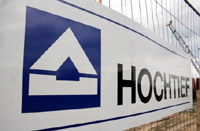 The Spanish construction company ACS has secured an around 31.59 percent stake in the German construction giant Hochtief in connection with the bid submitted in December. At the end the Spaniards had lifted their offer from eight to nine ACS shares for five Hochtief ones. The Federal Financial Supervisory Authority (BaFin) could find no illicit agreements between ACS and the financial investor, Southeastern Asset Management, which holds shares in both ACS and Hochtief, and waved the transaction through. This paved the way for the Spaniards to purchase additional shares in the Essen-based group and in the long term incorporate Hochtief entirely. The German company is valued on the stock exchange at five billion euros and has liquid funds of €2.58 billion. In addition, the 55-percent share in Australian subsidiary Leighton alone is worth four billion euros. The last trump for Hochtief is now only a new capital increase, which would dilute the ACS share to below 30 percent. The Spaniards would then have to submit a new offer if they wanted to cross the 30-percent threshold again. To prevent ACS representatives from moving onto the supervisory board, Hochtief as well as shareholder association Schutzgemeinschaft der Kapitalanleger (SdK) have called for small shareholders to attend the shareholders' meeting planned for May 12th and stop the ACS project by a strong presence.
The Spanish construction company ACS has secured an around 31.59 percent stake in the German construction giant Hochtief in connection with the bid submitted in December. At the end the Spaniards had lifted their offer from eight to nine ACS shares for five Hochtief ones. The Federal Financial Supervisory Authority (BaFin) could find no illicit agreements between ACS and the financial investor, Southeastern Asset Management, which holds shares in both ACS and Hochtief, and waved the transaction through. This paved the way for the Spaniards to purchase additional shares in the Essen-based group and in the long term incorporate Hochtief entirely. The German company is valued on the stock exchange at five billion euros and has liquid funds of €2.58 billion. In addition, the 55-percent share in Australian subsidiary Leighton alone is worth four billion euros. The last trump for Hochtief is now only a new capital increase, which would dilute the ACS share to below 30 percent. The Spaniards would then have to submit a new offer if they wanted to cross the 30-percent threshold again. To prevent ACS representatives from moving onto the supervisory board, Hochtief as well as shareholder association Schutzgemeinschaft der Kapitalanleger (SdK) have called for small shareholders to attend the shareholders' meeting planned for May 12th and stop the ACS project by a strong presence.
Qatar stands by Volkswagen
 The influence of the Emirate of Qatar at Volkswagen is consolidating. The Arabs already have 17 percent of the shares in the Wolfsburgers, and are represented on the supervisory board. Now, reports Financial Times Deutschland, the Emirate will replace RWE CEO Juergen Großmann at the General Meeting on 3 May. That would give the Qataris two seats on the supervisory board. Only in mid-January, Qatar Holding agreed to join in subscribing a planned capital increase at Porsche totalling five billion euros. In order to maintain their ten-percent stake in the Stuttgart sports-car manufacturer, the Arabs will put a three-digit million euro amount on the table. The capital increase should reduce the debt at Porsche of six billion euros, which the sports-car maker has amassed in the failed battle to take over Volkswagen. At the end of the year a green light for the merger came from the US: a New York court had rejected the billion-dollar suit by several funds for compensation from Porsche.
The influence of the Emirate of Qatar at Volkswagen is consolidating. The Arabs already have 17 percent of the shares in the Wolfsburgers, and are represented on the supervisory board. Now, reports Financial Times Deutschland, the Emirate will replace RWE CEO Juergen Großmann at the General Meeting on 3 May. That would give the Qataris two seats on the supervisory board. Only in mid-January, Qatar Holding agreed to join in subscribing a planned capital increase at Porsche totalling five billion euros. In order to maintain their ten-percent stake in the Stuttgart sports-car manufacturer, the Arabs will put a three-digit million euro amount on the table. The capital increase should reduce the debt at Porsche of six billion euros, which the sports-car maker has amassed in the failed battle to take over Volkswagen. At the end of the year a green light for the merger came from the US: a New York court had rejected the billion-dollar suit by several funds for compensation from Porsche.
Capital writedown at Conergy
 Already since 2008, photovoltaic manufacturers Conergy were sailing with a considerable list in difficult waters; after the departure of CEO Andreas von Zitzewitz in August Conergy now drifted leaderless into the next disaster. In mid-January the Hamburg-based company had to tell its shareholders it had lost half the equity. Trading in the stock was suspended for a short time after this bad news. When it resumed, the share price was down 12.9% to only 45 cents. The loss of 190 million euros resulted from the revaluation of a loan receivable from a subsidiary. At a forced Extraordinary General Meeting scheduled for the 25th of February, shareholders now have to bring a capital writedown and subsequent capital increase on the way. The capital of some 400 million euros is to be reduced to 50 million euros, and in a second step increased to €188 million. This measure was already worked out in December in cooperation with Commerzbank and two hedge funds. The two hedge funds York and Sothic will thereafter hold the majority stake. A further complication is that rebel shareholders after 2008 have once again brought an action against the decisions of the last ordinary general meeting: they want to ensure that the decisions on discharge to the Executive and Supervisory Boards as well as the authorization to increase capital and issue convertible bonds will be withdrawn. As early as 2008, Conergy had to reach an expensive settlement with the then plaintiff shareholders. Thanks to the new shareholders’ approval process the position of the rebels is weaker this time; Conergy is at least not threatened with a blockade of its decisions, but if the company’s proposed capital reduction does not succeed on 25 February, then management would have to rely on the contested decisions.
Already since 2008, photovoltaic manufacturers Conergy were sailing with a considerable list in difficult waters; after the departure of CEO Andreas von Zitzewitz in August Conergy now drifted leaderless into the next disaster. In mid-January the Hamburg-based company had to tell its shareholders it had lost half the equity. Trading in the stock was suspended for a short time after this bad news. When it resumed, the share price was down 12.9% to only 45 cents. The loss of 190 million euros resulted from the revaluation of a loan receivable from a subsidiary. At a forced Extraordinary General Meeting scheduled for the 25th of February, shareholders now have to bring a capital writedown and subsequent capital increase on the way. The capital of some 400 million euros is to be reduced to 50 million euros, and in a second step increased to €188 million. This measure was already worked out in December in cooperation with Commerzbank and two hedge funds. The two hedge funds York and Sothic will thereafter hold the majority stake. A further complication is that rebel shareholders after 2008 have once again brought an action against the decisions of the last ordinary general meeting: they want to ensure that the decisions on discharge to the Executive and Supervisory Boards as well as the authorization to increase capital and issue convertible bonds will be withdrawn. As early as 2008, Conergy had to reach an expensive settlement with the then plaintiff shareholders. Thanks to the new shareholders’ approval process the position of the rebels is weaker this time; Conergy is at least not threatened with a blockade of its decisions, but if the company’s proposed capital reduction does not succeed on 25 February, then management would have to rely on the contested decisions.
Springer takes over Seloger
With a markup of €4.05 to now €38.05 per share, Axel Springer has crushed the resistance at Seloger. The offer, upped on 18 January by twelve percent, values the French real-estate portal company at €634 million. The Supervisory Board of Seloger recommended its shareholders to accept the offer because the bid now reflects the true value and growth prospects of the online company. The original offer of 34 euros was rejected by the company as too low and the AMF’s takeover permission challenged at the Paris Court of Appeal. The requirement for the new offer is a minimum acceptance rate of 50.01 percent, inclusive of the already acquired 12.4 percent.
EU searches MAN and Daimler

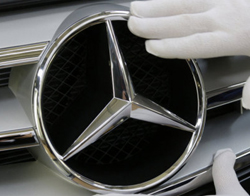 Several European truck manufacturers had an unannounced visit by EU competition watchdogs on 18 January. The reason is the suspicion MAN, Scania and Daimler could have breached provisions for the prohibition of cartels and abuse of dominant position. The EU Competition Commission, while confirming the searches, stressed that the operation does not imply that the companies concerned had actually behaved illegally. The suspects announced their willingness to cooperate with the competition watchdogs. Already in September 2010 British antitrust authorities had searched Daimler offices near London, and submitted written questions to Scania and MAN.
Several European truck manufacturers had an unannounced visit by EU competition watchdogs on 18 January. The reason is the suspicion MAN, Scania and Daimler could have breached provisions for the prohibition of cartels and abuse of dominant position. The EU Competition Commission, while confirming the searches, stressed that the operation does not imply that the companies concerned had actually behaved illegally. The suspects announced their willingness to cooperate with the competition watchdogs. Already in September 2010 British antitrust authorities had searched Daimler offices near London, and submitted written questions to Scania and MAN.
ProSieben owners sell shares
Kohlberg Kravis Roberts (KKR) and Permira have taken nearly €200 million with the sale of eight million ProSiebenSat.1 preference shares at €24.20 each. The two private-equity firms initiated an accelerated book-building process for the sale of a 3.7 percent stake to institutional investors, they say. With the proceeds, the financial investors want to pay back debts they have accumulated in Lavena Holding. After the placement KKR / Permira keep an unchanged 88 per cent of the ordinary shares and just under 18 percent of the prefence shares, so that 53 percent of the share capital of ProSiebenSat.1 is now bundled in the Lavena group.
Counter-motion at Siemens fails
 The association of employee shareholders of Siemens had put a counter-motion for the Annual General Meeting on 25 January, proposing significantly lower pay than the administration. The motion said that Supervisory Board members should be paid only about half of what the administration proposed. Siemens, however, wanted variable components of compensation for Supervisory Board members completely eliminated and in future replaced by flat-rate pay of €140,000 independently of the company's success. Ultimately, the group's proposal was approved by a majority of 93.2 percent. Among the proponents of fixed remuneration was also shareholder association Deutsche Schutzvereinigung für Wertpapierbesitz, which contrary to the Corporate Governance Code said that "in future only fixed salaries without variables should be used."
The association of employee shareholders of Siemens had put a counter-motion for the Annual General Meeting on 25 January, proposing significantly lower pay than the administration. The motion said that Supervisory Board members should be paid only about half of what the administration proposed. Siemens, however, wanted variable components of compensation for Supervisory Board members completely eliminated and in future replaced by flat-rate pay of €140,000 independently of the company's success. Ultimately, the group's proposal was approved by a majority of 93.2 percent. Among the proponents of fixed remuneration was also shareholder association Deutsche Schutzvereinigung für Wertpapierbesitz, which contrary to the Corporate Governance Code said that "in future only fixed salaries without variables should be used."
D&O insurance covers Sky’s damages
 Sky Deutschland has had manager-liability insurance costs incurred in an out-of-court settlement for former board members reimbursed. The pay-TV channel would therefore not now be making claims against former directors around Georg Kofler responsible at the time. In the phony subscriber numbers affair, Sky had paid €14.5 million to institutional investors from the USA, Luxembourg, Germany and Switzerland. The plaintiffs’ claims amounted to €242.5 million initially. The TV platform had after the takeover by Rupert Murdoch in 2008 admitted it did not as claimed have three million subscribers, but only 2.4 million.
Sky Deutschland has had manager-liability insurance costs incurred in an out-of-court settlement for former board members reimbursed. The pay-TV channel would therefore not now be making claims against former directors around Georg Kofler responsible at the time. In the phony subscriber numbers affair, Sky had paid €14.5 million to institutional investors from the USA, Luxembourg, Germany and Switzerland. The plaintiffs’ claims amounted to €242.5 million initially. The TV platform had after the takeover by Rupert Murdoch in 2008 admitted it did not as claimed have three million subscribers, but only 2.4 million.
Buhlmann's Corner
A nifty, if niffy, promotion
 No thinking person, and certainly no investor, will envy anyone this. It’s only that it makes you nervous when Friday’s active board member will be overseeing the managers of the assets on Monday, without evaluating Thursday’s decisions.
No thinking person, and certainly no investor, will envy anyone this. It’s only that it makes you nervous when Friday’s active board member will be overseeing the managers of the assets on Monday, without evaluating Thursday’s decisions.
This thought and no other played a role for the German legislature, when it in general fairly strictly barred a director from moving to the Supervisory Board within the same company from one week to the next. It was right. And also rightly, it allowed an exception, which steel tycoon Ekkehard Schulz now wants to take advantage of.
At ThyssenKrupp there are on the one hand the loyal shareholders with a quarter of the quorum, and on the other little criticism. This has been so at least since the introduction of the immutable secondment right. Now the CEO was whining for a seat on the Supervisory Board. No longer really an issue for a dependent company, but since it’s still listed on the DAX, it gets noticed. The DSW was in principle against the change from Executive to Supervisor, but in this case, next to the forty years of professional experience there were “at least 54 more arguments” for it. The SdK is in principle against the change, but “exceptionally in this case ...”. Especially since the former CEO was becoming “only a supervisory board member and not chair”. Let’s wait and see how long it takes.
Of the 58 percent of the capital present, ten percent less took part in the elections to the Supervisory Board. Presumably, the remaining 3 percent of the 58 wanted to abstain, something that German lawyers, without explanation, count as “not present”. Of the remaining 55 percent, 80 percent then finally voted for the election of the ex CEO to the Supervisory Board.
Since the Krupp Foundation combines 27 percent of the capital, Schulz received only 145 million free shareholder votes out of a total of 515 million shares outstanding – that is, only 28 percent of the non-endowed capital. To be elected by a quarter to a third of the free votes is not a very big success for the person – it is a success for the cause. Corporate governance has won for a second time at ThyssenKrupp: keep this procedure an exception and it will not become the rule to skip the cooling-off.
ACTIONS CORNER
More than five years after the leadership change at Daimler from Jürgen Schrempp to Dieter Zetsche, the highest European court will soon have to deal with the case. The Bundesgerichtshof (BGH) presented to the European Court a class action by several Daimler shareholders against the carmaker because of possible late notification of the change in leadership, for a preliminary ruling, the Karlsruhe court announced on 23 December 2010. The BGH is hoping for clarity on the interpretation of several EU directives on insider dealing and market manipulation.
Deutsche Telekom has reached a settlement with Kai-Uwe Ricke and Klaus Zumwinkel. As the company announced, it had secured an "amicable agreement" in relation to civil claims against the former CEO and former chairman of the supervisory board in connection with the spying affair in the years 2005 and 2006. As part of the agreement, the two company officers have committed themselves to covering "a significant part of the damage caused Deutsche Telekom, by payments each of the same amount". They had also agreed not to claim a likewise equal amount of the payments against D&O insurance. The forthcoming annual general meeting must still approve the settlement.
Munich district court on 20 January threw out actions for avoidance by 38 former shareholders of the ailing Hypo Real Estate (HRE) against transfer of their shares to the government at €1.30 per share. The federal government did not violate the Basic Law by excluding shareholders in the former MDAX company by “squeeze-out”, the chamber under the chairmanship of Helmut Krenek held. The October 2009 Annual General Meeting’s resolution was consistent with the Basic Law and the provisions of the EC Treaty and of corporate law, the Court further found.
Infineon and Ulrich Schumacher have reached agreement on a settlement in their legal disputes, pending for years. The semiconductor company will accordingly pay the ex-CEO an annual pension of €560,000 from 2018 on. As the invitation to the AGM on 17 February in Munich shows, the settlement extinguishes all mutual claims, including those between Schumacher and Max Dietrich Kley, against whom the former chief had won a libel suit in 2007 before Hamburg Higher Regional Court. Shareholders must still approve the agreement, however.
Infineon has filed a declaratory action against Michael Jaffe with Munich District Court, after the Qimonda insolvency administrator brought a lawsuit against the semiconductor group in December 2010. The chipmaker wanted to use patents passed to its bankrupt subsidiary itself again, according to the lawsuit. Infineon aims to prove that while patents were assigned to the Qimonda Group in 2006, it still retained the rights of use. These, however, did not exist any more because of the insolvency, says Jaffe instead. An amicable arrangement had for the moment failed, says the DAX Group. Further reserves were being set aside for the case, which according to Infineon represented an €80 million charge to earnings.
MAN is calling in the bribery scandal for damages in the amount of €237 million from Håkan Samuelsson. A similar claim had been made on Samuelsson in summer by the supervisory board under Ferdinand Piëch. The former chairman is accused of enabling bribes through inadequate control systems. Samuelsson had resigned his post in late 2009 due to the corruption scandal. In addition, the commercial-vehicle and engine manufacturer had taken out a liability policy for board members with two insurance companies, which the company apparently wants to use.
Next to the record damages of 1.3 billion dollars imposed in November against SAP and the reimbursement of Oracle’s legal costs, the Walldorf-based group now has to make million-dollar interest payments to its arch-rivals, the U.S. District Court in Oakland, California decided on 28 December 2010. Oracle is calling in this context for an additional $211,000,000 for the time between the offence punished and the ruling. SAP's calculation method, however, estimated the additional cost at around 16.5 million dollars. District Judge Hamilton has so far not determined any specific amount.
Thomas Ganswindt is to be the first former Siemens top manager to go to court on charges to do with the corruption affair. Although the trial began on 20 January, it had to be interrupted after 15 minutes. Lawyers for the defendants complained that only two and not three judges were used for the complex procedings. The Munich district court upheld the objections to the composition of the criminal bench. The corruption case against the former Siemens board member was finally reopened on 25 January. That day also saw the DAX Group’s AGM. The prosecution accuses the ex board member of knowing of the system of slush funds but having done nothing about it. He had thereby violated his duty of supervision and been guilty of tax offences. Ganswindt had already partially confessed. The former central board member claims he first learned of corrupt acts by former subordinates from the indictment. So far only ex-manager Johannes Feldmayer has been convicted, in November 2008, and sentenced to two years’ probation. Munich prosecutors are also preparing charges against Siemens managers Uriel Sharef and Heinz-Joachim Neubürger. Siemens is demanding five million euros damages from Ganswindt, and from Neubürger as much as 15 million euros.
For a year, a committee of inquiry in Athens has been looking into whether Greek politicians and officials have received bribes from Siemens. It is estimated that bribes of up to €100 million have been passed. The recipients allegedly included former Prime Minister Simitis and numerous ministers of his party, and several former ministers of the opposition New Democracy party. Now the Greek government is calling for compensation from the industrial group. The damages amount to two billion euros, says Greek Minister Pamboukis. A legal claim for damages has still not been received by Siemens.
AGM Dates
| Company | Event | Date | Time | Place | Address | Published on |
| MDAX | ||||||
| Demag Cranes | ord.AGM | 02.03.2011 | 10:00 | 40474 Düsseldorf | Stockumer Kirchstr. 61, Congress Center, Stadthalle | 19.01.2011 |
| The Agenda for the ordinary AGM of Demag Cranes AG starts with the usual items, like presentation of annual accounts and discharge to the company bodies. Demag Cranes AG earned balance-sheet profits of €75.76m last business year. Of the profits, €12.7m is to be paid out as dividend and €63.05m carried forward to a new account. Confirmatory elections to the Supervisory Board are to be held. A resolution approving the board members’ pay system is to be taken. The existing Authorized Capital is to be replaced by a new one of €10.59 million. | ||||||
| TUI | ord.AGM | 09.02.2011 | 10:30 | 30175 Hannover | Theodor-Heuss-Platz 1-3, im Congress Centrum | 30.12.2010 |
| The Agenda for the ordinary AGM of TUI AG starts with the usual items, like presentation of annual accounts and discharge to the company bodies, as well as the submission of the corrected consolidated financial statements for the business year 2008 as per 31 December 2008 and for the short financial year 2009 as per 30 September 2009. The balance-sheet profits of €13,63 million are to be carried forward in full to a new account. Elections to the Supervisory Board are to be held. A Resolution authorizing the Board to increase share capital with possible exclusion of subscription rights, inter alia in connection with the use of cash contributions, is to be taken. For this purpose, the existing Authorized Capital is to be replaced by a new one of €246.0 million. The company is to be authorized to purchase its own shares and use them, excluding shareholders’ subscription and tendering rights, and possibly to withdraw its own shares and reduce the share capital. | ||||||
| TecDAX | ||||||
| Conergy | extraord.AGM | 25.02.2011 | 10:00 | 20355 Hamburg | Am Dammtor/Marseiller Straße 2, CCH-Congress Center | 18.01.2011 |
| On the agenda of the extraordinary AGM of Conergy AG is the Executive Board's announcement of a loss equal to half the share capital. The Board report on the restructuring of Conergy AG and the proposed corporate action is to be taken. Furthermore, a Resolution reducing the share capital of the Company, in simplified form, in an 8:1 ratio to €49,761,116.00, divided into 49,761,116 bearer shares, is to be taken. The reduced share capital may be increased against contributions in cash and in kind by up to €187,790,283.00, by issuing new shares, to up to €237,551,399.00. | ||||||
Politics
No quota for women yet
 In the 200 largest German companies just 3.2 percent of board positions are occupied by women. In the 100 largest companies, the share is only 2.2 per cent. Only four of 182 board positions in the largest German listed companies are held by women. A look at the supervisory-board side is also sobering: four supervisory bodies in the DAX get by without any women at all. On average, the proportion of women is 13.1 percent, but the women are mostly seconded as employee representatives. Female representatives on the capital side are usually members of the founding family. In an international comparison, women’s share in major German companies ranked on a par with India, and still well behind Brazil, China and Russia.
In the 200 largest German companies just 3.2 percent of board positions are occupied by women. In the 100 largest companies, the share is only 2.2 per cent. Only four of 182 board positions in the largest German listed companies are held by women. A look at the supervisory-board side is also sobering: four supervisory bodies in the DAX get by without any women at all. On average, the proportion of women is 13.1 percent, but the women are mostly seconded as employee representatives. Female representatives on the capital side are usually members of the founding family. In an international comparison, women’s share in major German companies ranked on a par with India, and still well behind Brazil, China and Russia.
She wants to change this, stated Federal Minister of Labour Ursula von der Leyen (CDU), announcing a codified women’s quota in the news magazine Der Spiegel. The exact steps and the timeline she wanted to tie down this year. According to the Minister, the rate should be 25 to 30 percent and apply in less than five years to all German companies. Federal Minister for Family Affairs Kristina Schröder (CDU) also sees a need for action. She prefers a binding commitment by companies that each company can determine for itself and must then meet within two years. For two days a media battle raged, until the Chancellor laid down the law: she wants to give businesses more time to raise the percentage of women at a senior level voluntarily.
Many board members are underinsured
The statute of limitations for personal liability of managers was raised by the federal government, most recently to ten years. For all claims not barred by 15 December 2010, the new deadline now applies. The background to this is that financial institutions especially were thus to be given the possibility to work off the financial crisis legally. Current directors’ and officers’ (D & O) insurance for directors and supervisory and management officers of credit institutions as well as executives and supervisory board members of listed companies usually covers a period of five years only. The managers may now face damages they will have to pay for themselves. While some insurers have recently offered contracts with longer terms, with an insurance change there is the issue of secondary liability. For example, if an error committed in 2008 is only discovered in 2009 and the insurer was changed in 2015, then the insurer pays only when the follow-up liability period is ten years.
Bank levy with a surcharge
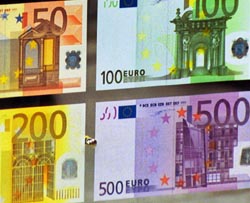 The bank levy is to create a 70-billion-euro restructuring fund in Germany, from which in future the rescue of banks in difficulties is to be financed. The charge is calculated by a complicated key as a fixed percentage of total assets, and was to be capped at fifteen percent of a bank’s HGB (Commercial Code) profits. But at the end of 2010 the Treasury submitted a paper laying down an arrears obligation. Here the banks are later to pay the difference between the amount payable and the fifteen-percent limit. This repayment obligation would undermine the acceptability of the fifteen percent limit, said the Federal Association of German Banks (BdB), criticizing the project. The regulation must still be approved by both the Bundestag and the Bundesrat.
The bank levy is to create a 70-billion-euro restructuring fund in Germany, from which in future the rescue of banks in difficulties is to be financed. The charge is calculated by a complicated key as a fixed percentage of total assets, and was to be capped at fifteen percent of a bank’s HGB (Commercial Code) profits. But at the end of 2010 the Treasury submitted a paper laying down an arrears obligation. Here the banks are later to pay the difference between the amount payable and the fifteen-percent limit. This repayment obligation would undermine the acceptability of the fifteen percent limit, said the Federal Association of German Banks (BdB), criticizing the project. The regulation must still be approved by both the Bundestag and the Bundesrat.
EU flays cartels
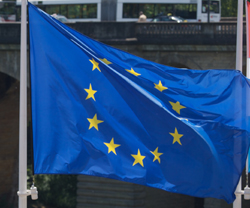 At the end of the year competition sanctions imposed in the EU in 2010 totalled €3.05 billion. In 2011 there will probably be more, because the EU Commission’s success is increasing through whistleblower programmes and international cooperation of agencies. Since the programmes were introduced eight years ago and tightened again four years ago, dozens of cartels were cleaned up that would otherwise probably never have been discovered. The Commission is also relying more on settlements instead of sentences. This relieves the courts and saves time finding evidence that can stand up in court.
At the end of the year competition sanctions imposed in the EU in 2010 totalled €3.05 billion. In 2011 there will probably be more, because the EU Commission’s success is increasing through whistleblower programmes and international cooperation of agencies. Since the programmes were introduced eight years ago and tightened again four years ago, dozens of cartels were cleaned up that would otherwise probably never have been discovered. The Commission is also relying more on settlements instead of sentences. This relieves the courts and saves time finding evidence that can stand up in court.
People
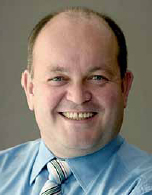 As already decided in early 2010, Manuel Bauer moved up to the Allianz board at the beginning of the year and is responsible there for all the DAX group’s growth countries, with nearly 30 million customers. The 56-year-old Austrian was previously head of Eastern Europe. 61-year-old Gerhard Rupprecht in turn retired from the board at the end of 2010 due to age. Joachim Faber, investment director, will resign at the year’s end on completion of his contract period, said the insurer. He will then also retire. His position on the board and at the head of Allianz Global Investors will be taken by Jay Ralph, Board Member responsible for the insurance business in the United States, Canada and Mexico.
As already decided in early 2010, Manuel Bauer moved up to the Allianz board at the beginning of the year and is responsible there for all the DAX group’s growth countries, with nearly 30 million customers. The 56-year-old Austrian was previously head of Eastern Europe. 61-year-old Gerhard Rupprecht in turn retired from the board at the end of 2010 due to age. Joachim Faber, investment director, will resign at the year’s end on completion of his contract period, said the insurer. He will then also retire. His position on the board and at the head of Allianz Global Investors will be taken by Jay Ralph, Board Member responsible for the insurance business in the United States, Canada and Mexico.
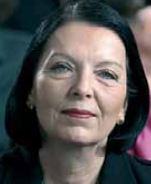
Christine Hohmann-Dennhardt is to take the new Board position on "Law and Integrity" at Daimler. The 60-year-old constitutional judge will be appointed in the first quarter. It is the first time a woman joins the top management of the Stuttgart-based carmaker. Her appointment in Karlsruhe expires at the end of January. Daimler would neither confirm nor deny the personal data.
As Kontron announced, the Supervisory Board has appointed Jürgen Kaiser-Gerwens as Chief Financial Officer from mid-February. The 48-year-old comes from Schott Solar. Born in Detmold, he previously worked at Unilever and Dynamit Nobel. A doctor in business administration, he succeeds Dieter Gauglitz, who gave up his post at the embedded-computer manufacturer in the course of the board rearrangement at the end of 2010.
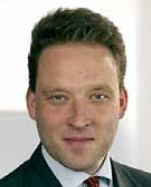 Matthias Zachert is moving this summer to Darmstadt pharmaceutical and chemical company Merck. The 43-year-old Lanxess Chief Financial Officer succeeds Michael Becker (62), retiring in the course of the year due to age, as personally liable partner. The supervisory board of Lanxess has agreed to the termination of Zachert’s contract, it was announced in Leverkusen on 3 February. As part of this extraordinary supervisory board meeting Bernhard Düttmann was also appointed to the board. On 1 April the 51-year-old succeeds as CFO at the chemicals group. In early January, the Düsseldorf native had left Hamburg Nivea manufacturer Beiersdorf after 21 years of activity in order to “pursue new professional challenges.”
Matthias Zachert is moving this summer to Darmstadt pharmaceutical and chemical company Merck. The 43-year-old Lanxess Chief Financial Officer succeeds Michael Becker (62), retiring in the course of the year due to age, as personally liable partner. The supervisory board of Lanxess has agreed to the termination of Zachert’s contract, it was announced in Leverkusen on 3 February. As part of this extraordinary supervisory board meeting Bernhard Düttmann was also appointed to the board. On 1 April the 51-year-old succeeds as CFO at the chemicals group. In early January, the Düsseldorf native had left Hamburg Nivea manufacturer Beiersdorf after 21 years of activity in order to “pursue new professional challenges.”
Marcel Brenninkmeijer has left the board of Q-Cells. The representative of the investor Good Energies, which holds just over 27 percent, he resigned with effect from 30 November. The major shareholder in the East German solar group had been on the board since 2003. The PV company wants to name a successor to Brenninkmeijer in the coming weeks.
Andrea Aulkemeyer, responsible for Internal Audit and Compliance at Rhön-Klinikum, resigned from the board at her own request at the end of 2010. As announced, Gerald Meder, director for technical, focused and intensive care and deputy chairman of the health service provider, also left at the year’s end. He however indicated that he remains connected to the group, and will, it was said, continue to take on tasks in the CEO’s area. Martin Menger, working for the last ten years in senior positions in northern Germany for the hospital chain, was newly appointed to the board as of 1 January. Volker Feldkamp has since 1 September 2010 been on the board of the private hospital operator in the operational area.
On 31 March Alan Hippe leaves ThyssenKrupp, to replace Erich Hunziker at Roche in early April. The Supervisory Board had dealt with the termination agreement on 21 January. No details on succession have yet been given. Hippe was financial officer at the German steel group for almost two years. It is alleged that the 44-year-old manager had hopes for the Chief Executive spot.
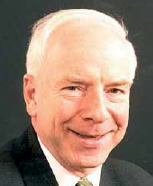
In a modification of the published list of proposals for the election of the entire TUIChristian Strenger was proposed. Christiane Hölz had withdrawn her candidacy in favour of the long-time member of the Government Commission on the German Corporate Governance Code, said the travel group on 21 January. supervisory board at the AGM on 9 February, from among German and international institutional investors
Khalifa Al Kuwari is to be elected at this year's shareholder meeting on 3 May as a full voting member of the Supervisory Board of Volkswagen (see ICCG 05/2010). Jürgen Grossmann is to step down from the Board for him. The RWE chief had very clearly opposed the takeover of Porsche. For a further position becoming free, a woman is allegedly being looked for.
Campus
Only one in eight still holds shares
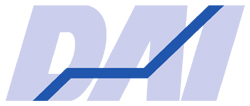 As the latest study by the German Share Institute (DAI) proves, more and more Germans are getting skeptical about securities. In the second half of 2010 the number of shareholders has again dropped significantly. Compared to the maximum level ten years ago, it declined by 36.4 percent to 8.2 million, accounting for 12.6 percent of the population. 3.4 million investors, representing 5.3 percent of the population, were directly invested in shares. Of the direct shareholders 604,000 are purely employee shareholders.
As the latest study by the German Share Institute (DAI) proves, more and more Germans are getting skeptical about securities. In the second half of 2010 the number of shareholders has again dropped significantly. Compared to the maximum level ten years ago, it declined by 36.4 percent to 8.2 million, accounting for 12.6 percent of the population. 3.4 million investors, representing 5.3 percent of the population, were directly invested in shares. Of the direct shareholders 604,000 are purely employee shareholders.
DIRK without Bommer
Kay Bommer has resigned at his own request as CEO of the German Investor Relations Association (DIRK) after nine years, in order to take up new professional challenges. Peter List was appointed provisional successor.
Metro tops for Annual Report
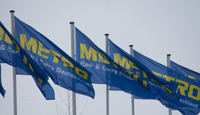 Once again this year, the Econ-Verlag in cooperation with Handelsblatt honoured firms for their financial communications in the categories of financial and sustainability reporting, image publishing and film, website, magazine, PR activities and strategic corporate communications, as well as the new discipline of social media. Of the numerous entries in the annual-report category, Metro AG was awarded platinum, the Austrian Wienerberger AG gold, Henkel AG & Co. KGaA silver and BMW AG bronze. Bertelsmann received a Special Award for its annual report. Bayer was awarded a bronze medal for its online annual report. Here, the chemical company is the most successful company in terms of corporate communication: the Leverkuseners reaped a total of three awards.
Once again this year, the Econ-Verlag in cooperation with Handelsblatt honoured firms for their financial communications in the categories of financial and sustainability reporting, image publishing and film, website, magazine, PR activities and strategic corporate communications, as well as the new discipline of social media. Of the numerous entries in the annual-report category, Metro AG was awarded platinum, the Austrian Wienerberger AG gold, Henkel AG & Co. KGaA silver and BMW AG bronze. Bertelsmann received a Special Award for its annual report. Bayer was awarded a bronze medal for its online annual report. Here, the chemical company is the most successful company in terms of corporate communication: the Leverkuseners reaped a total of three awards.
Firms outsource annual reports
The IR and PR consultancy cometis AG has asked many listed companies about their use in the past year of outsourcing services in the preparation of annual reports. Almost every second company stated here that its annual report is created by an IR agency. The most frequently cited reasons for this: know-how, freeing up staff, quality and time saving. The decisive points for the selection of an IR agency are its costs, references, the team and their understanding of investors’ requirements. Service providers take over mostly the design or the graphic creation, editing, and the drafting of the texts for the image section. Only 40 percent have the situation report also done outside. Basically, the language-intensive work (such as the letter from the Board) or know-how-intensive parts (such as the market part) are more often created by an agency. Overall, concludes cometis, external partners are indispensable for the creation of financial reports. On the one hand, they have their own graphics departments and thus higher manpower. Second, they usually look after several companies and have gained deep technical know-how.
In addition to the cometis study, geschäftsberichte-portal asked companies about the use of online content management systems in the preparation of annual reports. One in two said they did not use such a system. However, about three-quarters of respondents plan to deploy such a system in the future. In many cases the system is provided by an IR service. The majority see the advantage of the systems in the consolidation of layout and content. The user experience is also a crucial selection criterion.
Online IR increasingly important
New social media, or new formats such as HTML online annual reports, are lastingly changing the dialogue between IR departments and investors, according to a study by the German Share Institute (DAI) and the consulting firm NetFederation. Thus, the majority of respondents feel the importance of online IR will continue to rise. The homepage has long been one of the most important information sources for potential investors when taking investment decisions. One of the most widespread of the innovative instruments is the digital business report in HTML format with improved viewing and navigation. The approach to online shareholder meetings is, however, inconsistent. True, the majority of DAX companies already have these or at least plan to, but some of the concerns are hesitant towards the new ways. Many companies are also wary of using Web 2.0 applications. The majority of firms are not yet planning to use Facebook, Twitter, YouTube or blogs for IR purposes. The greatest obstacle seen here is that such formats tie up resources, and postings have to be constantly fed with current information.
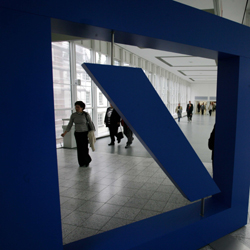 Deutsche Bank system-relevant
Deutsche Bank system-relevant
The Japanese newspaper Mainichi Shimbun in late December 2010 published a Japanese Securities and Exchange list of the 60 most system-relevant banks worldwide. Number one, finishing ahead of the U.S. banks Goldman Sachs and JP Morgan, was the Deutsche Bank.
Capital News
Aurubis has carried out a capital increase by way of an accelerated bookbuilding process. By partly utilizing its authorized capital, the copper producer increased its common stock by €10,462,653.44, as was announced on 12 January after market close. Against cash contributions and to the exclusion of subscription rights of existing shareholders, 4,086,974 new shares were placed with German and international institutional investors. the transaction will bring the copper group €169.6 million. Salzgitter has let its share in Europe's largest copper smelter be diluted.
With the help of Credit Suisse, Citigroup, Goldman Sachs and UBS, Commerzbank called in part of its hybrid papers and converted it into 118,135,291 shares, it was announced. The share capital thus increased by ten percent minus one share. The new shares of the bank were placed at €5.30 each, a discount of six percent from the closing price on 13 January. The issue, with a volume of €626 million, had been oversubscribed many times. The consortium thus picked up the hybrid securities at prices significantly below their face value. Depending on the type of papers issued by Commerzbank and its subsidiary Eurohypo, the offer saw markdowns of between 30 and 50 percent. With the conversion Commerzbank captured an IFRS pre-tax profit of some €300 million. The capital in the amount of 3.48 billion euros is now divided into 1.34 billion shares at €2.60 each.
Conergy has announced the loss of half its share capital of €398,088,928. The solar installations maker exempted certain of its subsidiaries, as planned, from their debts. This resulted in a loss of some €190 million, meaning the capital has fallen by almost half, said the solar company in Hamburg on 14 January. In an extraordinary general meeting convened for 25 February a capital reduction in an eight to one ratio to €49,761,116, followed by a capital increase in cash and kind to €188 million, is now proposed.
Sky Deutschland major shareholder News Corp has as announced subscribed a convertible loan to News Adelaide Holdings of €164.6 million. The convertible bond can be converted into 53,914,182 personal shares from conditional capital. The pay-TV broadcaster has taken in a total of €342 million, through a capital increase at the end of September 2010 and now the convertible bond. The additional funding of €58 million, announced on 12 January, is provided in the form of a shareholder loan from News Adelaide Holdings by 21 December at latest.
Director's Dealings
in January
| Company | Person | Function | Buy / Sell | Total value in Euro | Number of shares | Datum |
| Axel Springer | Oliver Heine | SB | S | 249.000 | 2.000 | 21.01.2011 |
| BASF | Kurt Bock | MB | B | 86.070 | 1.500 | 07.01.2011 |
| Beiersdorf | JJMR GBR | B | 999.692 | 24.150 | 12.-13.01.2011 | |
| Conergy | CoCo Beteiligung | S | 2.741.915 | 5.929.632 | 04.01.-01.02.2011 | |
| Deutsche EuroShop | Olaf Borkers | MB | S | 70.374 | 2.548 | 28.12.10-19.01.2011 |
| Deutsche EuroShop | Manfred Zaß | SB-Head | S | 46.384 | 1.600 | 03.01.2011 |
| Deutsche EuroShop | Kreke Immobilien | S | 199.500 | 7.000 | 23.12.2010 | |
| Deutsche Telekom | Hans-Jürgen Kallmeier | SB | B | 9.634 | 1.000 | 17.01.2011 |
| Fielmann | Hans Joachim Oltersdorf | SB | B | 268.380 | 4.000 | 14.-26.01.2011 |
| Fraport | Claudia Uhe | S | 23.825 | 500 | 27.12.2010 | |
| Gerresheimer | CCC Investment | S | 2.302.500 | 75.000 | 25.01.2011 | |
| HeidelbergCement | Andreas Kern | MB | B | 174.922 | 3.688 | 03.01.2011 |
| HeidelbergCement | Kötitzer Ledertuch- und Wachstuch-Werke | S | 28.619.500 | 595.000 | 18.01.2011 | |
| HeidelbergCement | Merckle Service | S | 1.610.677 | 33.486 | 18.01.2011 | |
| HeidelbergCement | SC Vermögensverwaltung | S | 2.153.175.844 | 47 | 21.01.2011 | |
| HeidelbergCement | Spohn Cement Beteiligungs | B | 2.233.714.069 | 46.887.365 | 21.01.2011 | |
| HeidelbergCement | Spohn und Knoell | S | 14.430.000 | 300.000 | 18.01.2011 | |
| HeidelbergCement | UBH Holding | outflow | 589.021 | 12.364 | 21.01.2011 | |
| HeidelbergCement | VEM Vermögensverwaltung | S | 50.629.315 | 1.062.748 | 21.01.2011 | |
| HeidelbergCement | VEM Vermögensverwaltung | B | 44.660.177 | 928.486 | 18.01.2011 | |
| HeidelbergCement | Württembergische Leinenindustrie | S | 646.116 | 13.686 | 28.12.2010 | |
| Henkel | Christoph Henkel | S | 690.720 | 15.000 | 07.01.2011 | |
| Henkel | Winfried Zander | SB | S | 5.350 | 116 | 06.01.2011 |
| KRONES | Leopold Kronseder | B | 9.346 | 200 | 12.01.2011 | |
| KRONES | Nora Kronseder | B | 9.349 | 200 | 12.01.2011 | |
| KRONES | Volker Kronseder | MB-Head | B | 2.365.000 | 55.000 | 29.12.2010 |
| KRONES | Norman Kronseder | SB | B | 2.365.000 | 55.000 | 24.12.2010 |
| LANXESS | Matthias Zachert | MB | S | 584.416 | 11.013 | 31.01.2011 |
| LEONI | Dominik Probst | B | 92.599 | 3.000 | 31.01.2011 | |
| MTU | Udo Stark | SB | S | 263.975 | 5.000 | 07.-14.01.2011 |
| QSC | Jürgen Hermann | MB | exercise of options | 33.825 | 16.500 | 10.01.2011 |
| RATIONAL | Peter Wiedemann | MB | B | 75.200 | 500 | 11.01.2011 |
| Singulus | Dr. Wolfhard Leichnitz | SB | B | 37.913 | 10.000 | 23.12.2010 |
| Vossloh | Dr. Norbert Schiedeck | MB-Head | B Call | 98.500 | 55.000 | 25.-28.01.2011 |
| Vossloh | Dr. Norbert Schiedeck | MB-Head | S Call | 322.000 | 115.000 | 14.01.2011 |
VIPsight Shareholders
in January
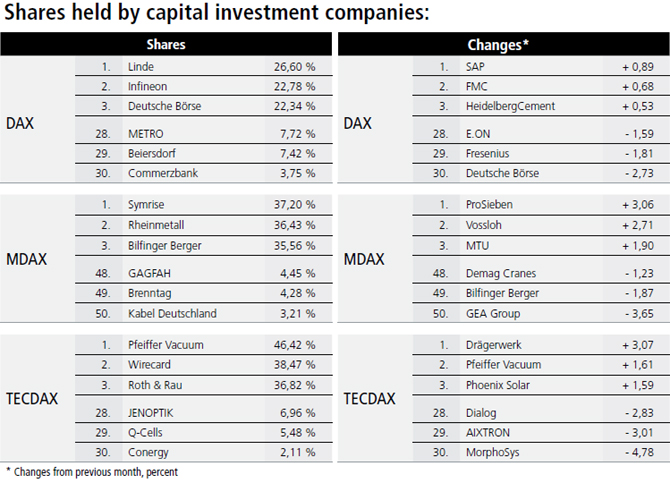
VIPsight Shareholder ID <click here>
Event Diary
5 February 2011 Organhaftung – neue Anforderungen nach der Krise [Officers’ liability - New requirements after the crisis]
Organizer: DAI; place: DVFA-Center im Signaris, Mainzer Landstrasse 37-39, Frankfurt am Main; cost: €900; info: 069 2915-0
24 February 2011 Dr. Wolfgang Schäuble, “Über das Verhältnis von Staat und Finanzmarkt – Lehren aus der Krise [On the relationship between the State and financial markets – lessons from the crisis]”
Organizer: CFS Colloquium “Relationship between State and Financial Markets”; place: Innenstadt Frankfurt; cost: none; info: www.ifk-cfs.de
24 and 25 February 2011 5. Haarmann Steuerkonferenz [5th Haarmann Tax Conference] 2011 Organizer: Haarmann Seminare und Veranstaltung GmbH; place: Hotel Adlon, Berlin; cost: €990; info: 069 920590
Reading suggestions
Gallati, Prof. Reto R., Verzinsliche Wertpapiere – Bewertung und Strategie [Income securities – valuation and strategy]
Gabler Verlag, 302 pp, €59.95, ISBN 978-3-8349-2799-6
There are good reasons for investors to take a closer interest than previously in rate-sensitive instruments. In the recent past a number of new tools with completely new properties have been developed. Only a knowledge of them enables an optimal strategy, tailored to individual goals in terms of yield, safety and availability of funds under management. New in this third edition are the topics of real-estate-backed securities and hedge funds. The author is Professor of Finance at the University of Chicago Booth School of Business.















